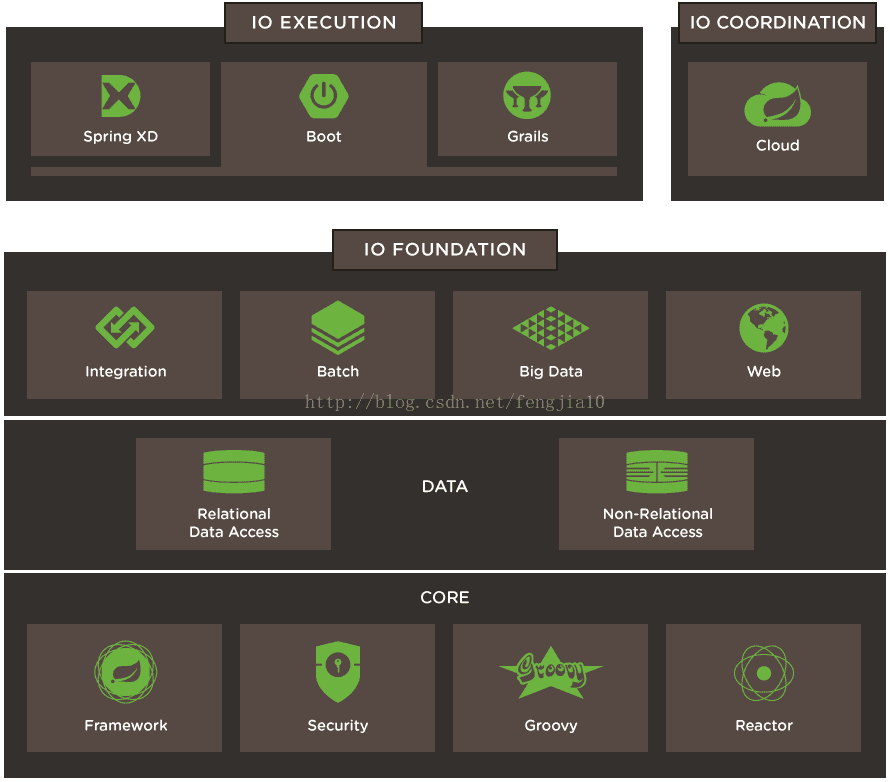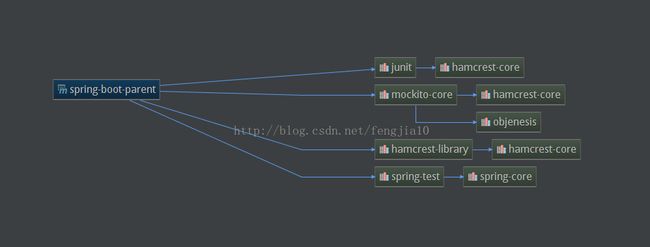Spring Boot POM 详解
正如这幅图所展示的那样,在Spring IO Framework体系中,Spring Boot处在Execution layer,来看看官方对这层的解释:
The Spring IO Execution layer provides domain-specific runtimes (DSRs) for applications built on the IO Foundation modules. A DSR may run standalone without requiring deployment to an external container.
还是引用官方的话来阐述一下Spring Boot主要是做什么的:
Spring Boot reduces the effort needed to create production-ready, DevOps-friendly, XML-free Spring applications. It simplifies bootstrapping of Spring projects with minimal code, implements an extensible set of operational features such as automated health checking and metrics endpoints, and supports embedded containers enabling the creation of self-contained executables.
来看看这里的几个关键词:
Production-ready,DevOps-friendly - 主要集中在Spring Boot Actuator模块,提供线上监控运维相关的特性,比方说health checking,metrics endpoints,或者通过提供诸如maven exec,或者类似one jar那种的self-contained executables。
XML-free - 预定义了很多Annotation,配置元编程风格。
Spring Boot给我的感觉更像是Spring社区的DevOps平台,集成并提供了诸如依赖管理,部署自动化,监控运维等特性。
Ok,到了这篇文章的重点部分。接下来,我们来分析一下Spring Boot是如何组织管理依赖的。来看一下它项目代码的POM结构。
首先是根目录的Pom,如:
org.springframework.boot
spring-boot-build
1.2.1.BUILD-SNAPSHOT
pom
Spring Boot Build 挺简洁的,除了声明了antrun,surefire和replacer插件外,就定义了包括default,integration,ci在内的三个profile。里面值得关注几个点:
1. 默认profile里面声明了一系列堪称最小依赖modules,如下:
spring-boot-dependencies
spring-boot-parent
spring-boot-versions
spring-boot-tools
spring-boot
spring-boot-autoconfigure
spring-boot-actuator
spring-boot-docs
spring-boot-starters
spring-boot-cli
这里面的关系,尤其是父子模块关系,后面会介绍。
2. 大家可以关注一下com.google.code.maven-replacer-plugin这个插件,主要是做属性文件替换的,和alibaba开源的antx maven插件有些类似。当然如果你热衷于maven的resources的filter机制,相信你会更喜欢这个replacer插件。
下面,我们来看看上面提到的父子模块关系, spring-boot-dependencies是一个parent pom,如下配置:
org.springframework.boot
spring-boot-dependencies
1.2.1.BUILD-SNAPSHOT
pom 它强制了maven版本,如:
3.0.2
并用dependencyManagement声明了一堆的依赖,如:
1.2.1.BUILD-SNAPSHOT
5.10.0
1.8.4
3.9.3
2.1.4
1.9.2
3.2.1
1.4
2.0.1
2.1
1.6
2.2
1.3.0
3.1.0
3.0
2.3.21
7.0.2
3.0.0
1.6
2.3.8
2.3
1.4.183
1.3
4.3.7.Final
${hibernate.version}
5.1.3.Final
2.2.5
2.4.5.Final
2.3.2
4.0.2
4.3.6
2.4.4
2.6.1
3.18.1-GA
1.0.0
1.5.2
1.2
1.1.6
2.0.5
2.5.2
2.14
9.2.4.v20141103
2.2.0.v201112011158
2.5
1.2.3
0.9.1
1.2
4.12
3.3.0
1.2.17
2.1
1.1.2
1.10.8
2.12.4
5.1.34
1.1.5.RELEASE
1.1.3.RELEASE
3.1.0
1.1.1
1.7.8
1.14
4.7.2
0.7-groovy-2.0
4.1.3.RELEASE
1.4.1.RELEASE
1.1.0.RELEASE
3.0.2.RELEASE
Evans-SR1
0.16.0.RELEASE
4.1.1.RELEASE
1.2.1.RELEASE
1.1.3.RELEASE
3.2.5.RELEASE
1.0.2.RELEASE
1.1.0.RELEASE
1.1.1.RELEASE
1.0.1.RELEASE
1.1.0.RELEASE
2.2.0.RELEASE
${javax-mail.version}
2.1.3.RELEASE
2.1.1.RELEASE
2.1.1.RELEASE
1.2.7
1.3
8.0.15
1.1.1.Final
1.7
2.0
1.6.3
问题来了,spring是如何测试并管理这些非spring生态圈依赖的?奥秘一切尽在下面的示例代码(原理比较简单,请参考文献2):
io.spring.platform
platform-bom
2.0.1.RELEASE
pom
import
除了对Jar的声明依赖,该pom还对maven常见plugin做了声明依赖,用过Maven version插件的同学都会觉得这是一个很好的习惯,对吧。除此之外,里面还有一个plugin git-commit-id-plugin需要额外注意一下,用过buildnumber plugin的同学可能会很好理解该plugin的功能。
最后来看一下 spring-boot-parent,这是一个二级parent pom,如下图:
重点提一下几个需要注意的点:
1. 混合使用dependencyManagement和dependencies,这个也是我比较喜欢的。
2. 详细配置了org.eclipse.m2e插件的lifecycleMappingMetadata,这个也很重要,对那些通过maven project方式将工程导入eclipse的同学无疑是个福音。
3. maven-enforcer-plugin插件的使用,这个也是我比较喜欢的,目前来看规则还是比较简单的,如:
(1.7,)
main.basedir
project.organization.name
project.name
project.description
更为详细的请参看enforcers官方文档,https://maven.apache.org/enforcer/enforcer-rules/https://maven.apache.org/enforcer/enforcer-rules/
4. maven-jar-plugin插件的使用,对于那些通过Java package API进行兼容性判断的工具很有用。
Ok,剩下的几个module都是在该父POM的基础上做了一些个性依赖,没什么好讲的,分析到这里就可以了。希望这篇文章能为那些立志于建立自己顶级POM的团队带来帮助。
参考文献:
1. http://docs.spring.io/spring-boot/docs/current-SNAPSHOT/reference/htmlsingle/#getting-started-introducing-spring-boot
2. https://dzone.com/articles/how-to-use-spring-io-platform-and-spring-boot-toge?utm_source=Top%205&utm_medium=email&utm_campaign=top5%202016-06-10

